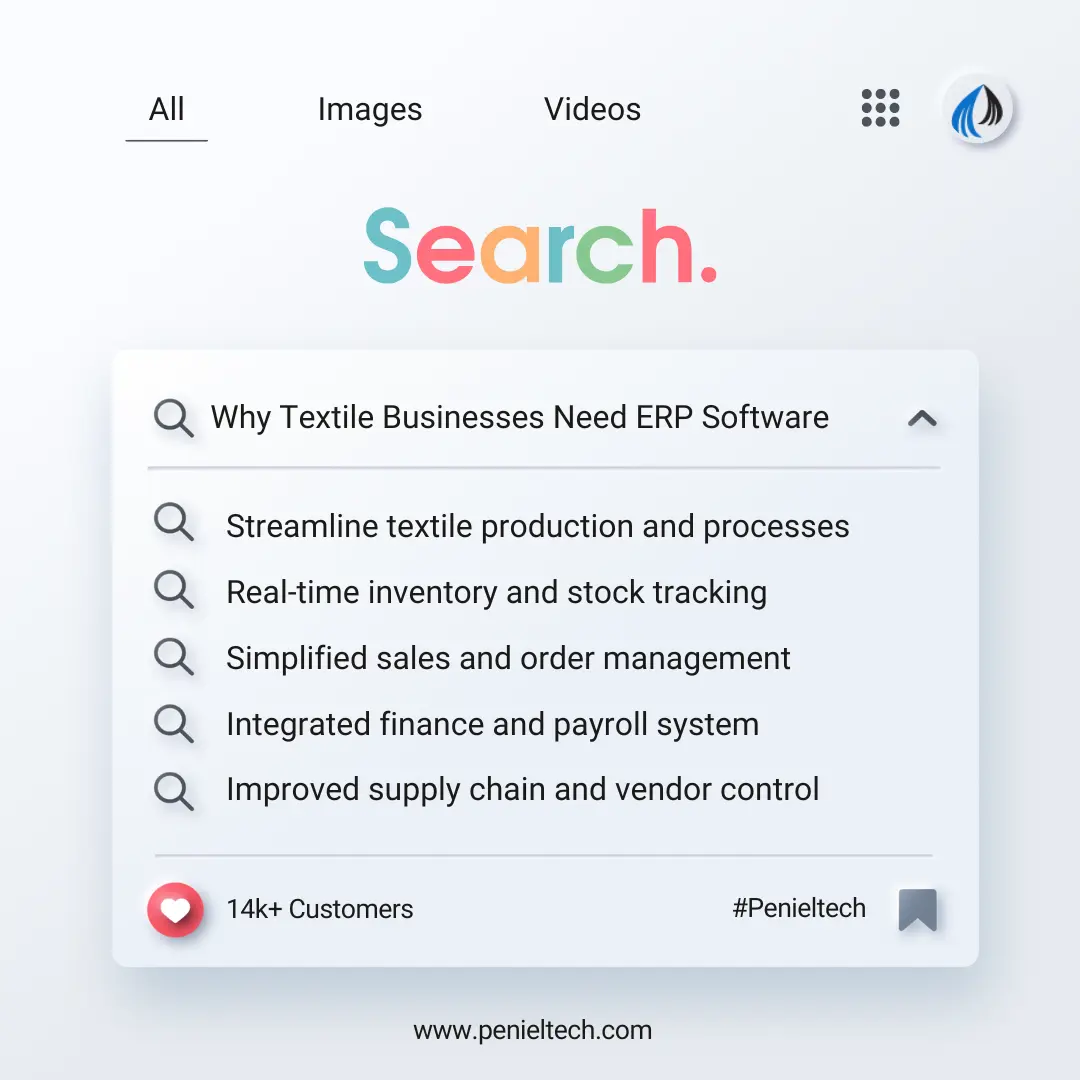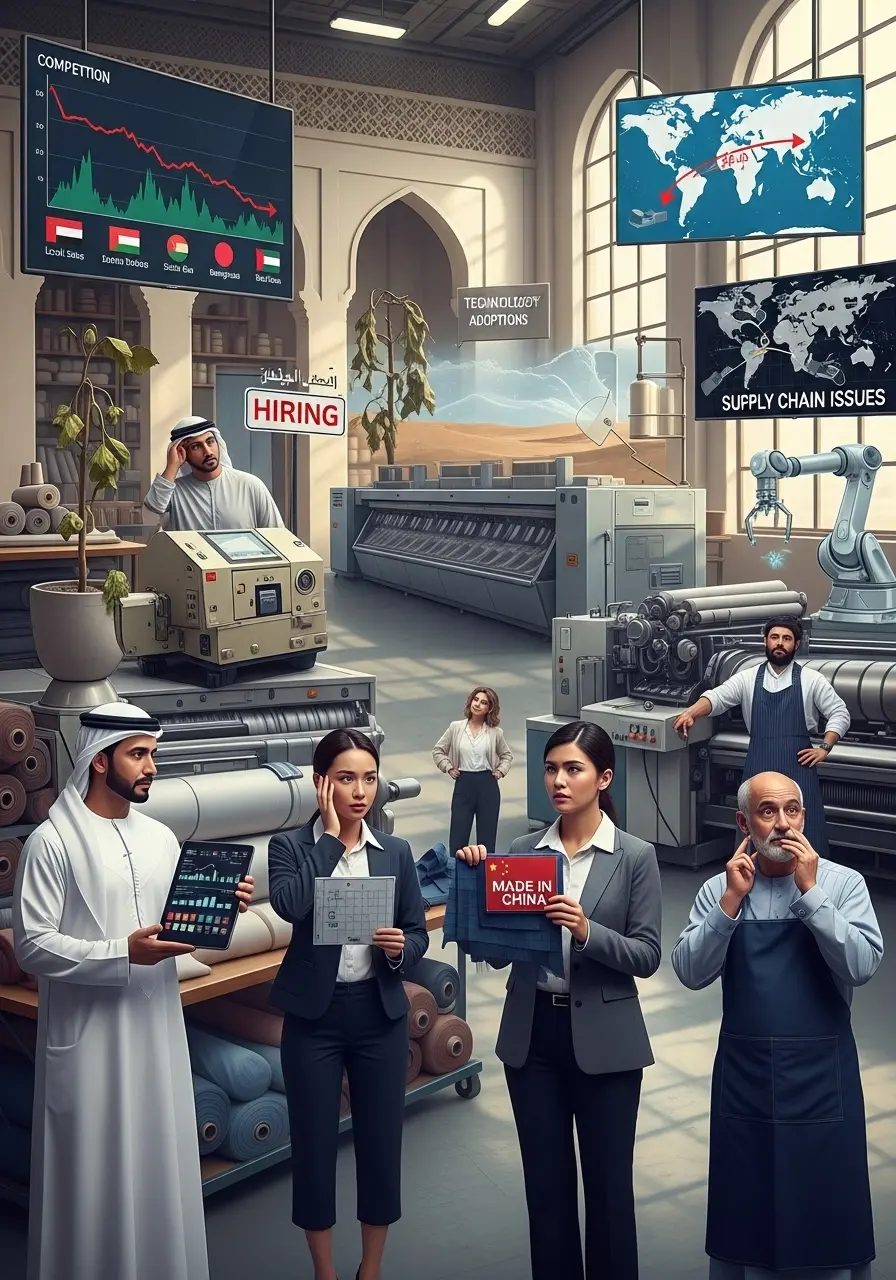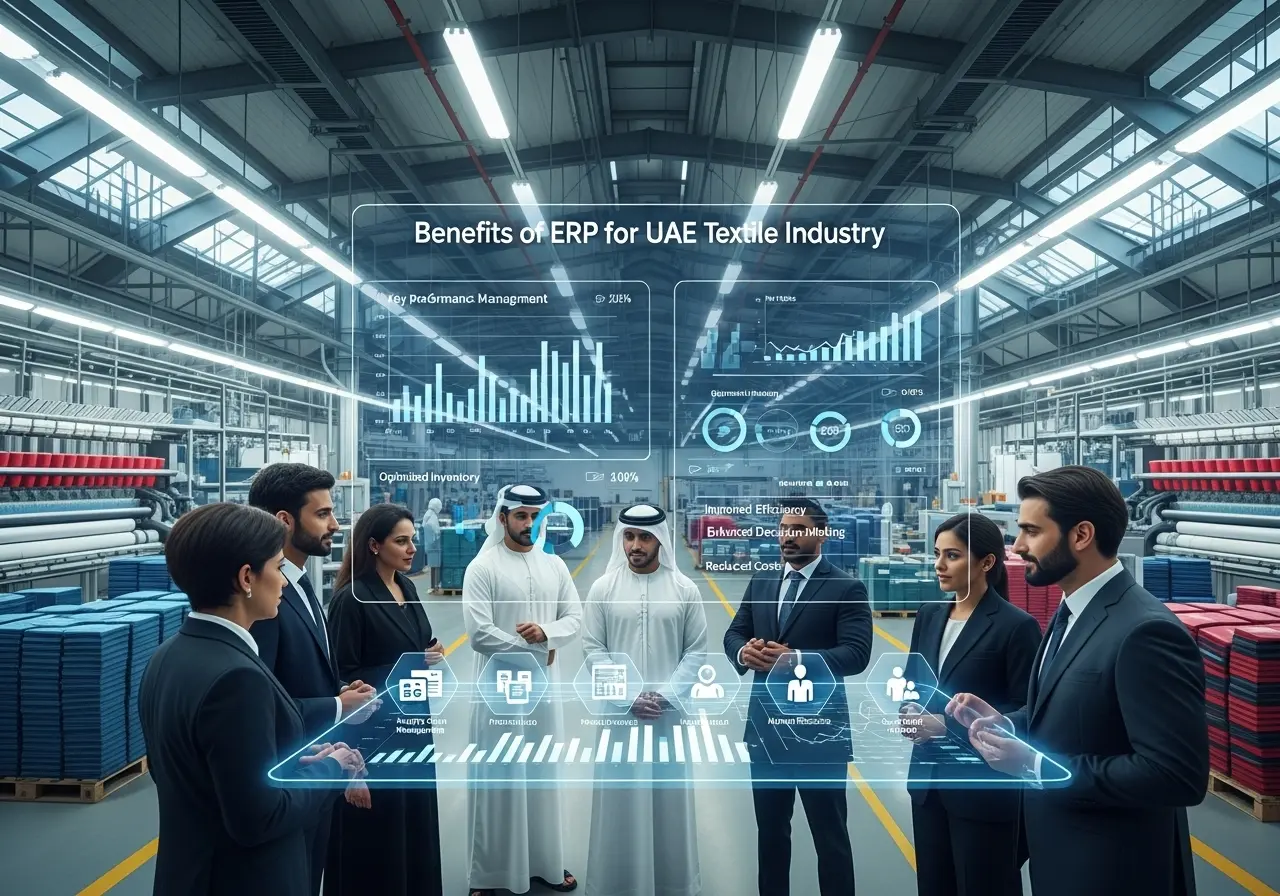ERP for Textile Industry
Undoubtedly, the UAE’s textile industry is as colorful as the products it produces and sells. From traditional abayas and kanduras to high-fashion exports destined for Europe, the range is vast. But this diversity brings its own set of headaches.

Running a textile business here isn’t as simple as just spinning fabric and selling it. If you’ve been in it for a while, you know the stress that comes with managing bulk orders, keeping up with seasonal demand, suppliers chasing you for payments, and customers wanting faster delivery at lower prices.
And let’s not even get started on the spiral stock management, where fabrics or other critical elements often get stuck, holding up an entire production line, or these changing fashion trends leave warehouses full of unsold stock.
For many textile companies, this constant pressure feels like trying to stitch with frayed thread. That’s where ERP for the textile industry (Enterprise Resource Planning) steps in as the framework to tie everything together.
Boost Textile Production Efficiency
Automate weaving, spinning, dyeing, and finishing with ERP. Get real-time insights to improve productivity and reduce delays.
Challenges the UAE textile industry faces
The textile sector here is unique. It’s nothing like running a simple shop. Here are some of the struggles owners and managers talk about:

Inventory confusion: Fabrics come in different rolls, cuts, blends, shades, and colors. Besides, there are dyes, threads, and finished goods that need to be tracked. It's extremely easy to lose track here without a proper ERP Software, because manual processes are the perfect recipe for disaster.
Seasonal demand: Demand is fickle in this industry. In one season, bright colors dominate the entire market, and the next, muted shades are in demand. Also, in the UAE, textile demand mainly goes up during Eid, wedding seasons, expos, and fashion shows. If you don’t have a clear view of stock and production, you’ll either overbuy or underdeliver.
Supplier management: Dealing with multiple vendors (sometimes from different countries) at once is too common in textile companies. It makes tracking orders, payments, and delivery timelines a headache.
Regulations and VAT: UAE’s VAT rules need accurate invoices and reporting. For exporters, adding customs paperwork adds another layer of stress.
Production planning: Sometimes, warehouses can become black holes even if one machine breaks down. In this industry, one delay at any stage can mess up the entire chain.
And all of these problems boil down to one word: visibility. Without it, businesses run blind.
What is ERP Software
You may have often heard people throwing the term around a lot, so let’s strip it down. ERP, short for Enterprise Resource Planning, sounds like something built for big corporations. But really, it’s just a way of centralizing how your business runs. It works as the “central brain” for your textile company.
Here’s what it does step by step:
- A sales team confirms a bulk fabric order. Instead of calling production, ERP for the textile industry automatically updates production planning.
- Production checks stock. If the dyeing material is short, the system alerts purchasing.
- Purchasing sends out supplier orders. Finance is updated with pending payments.
- As fabric is processed and shipped, the warehouse updates stock levels, and customers are notified.
Everyone in the chain sees the same truth. There are no separate versions floating around. That’s why companies across the UAE are moving to solutions like Elate ERP, built for multiple industries, VAT-compliant, and adapted to local business habits.
Simplify Inventory & Supply Chain
Track raw materials, fabrics, and finished goods while managing vendors and logistics in one system.
Features of ERP for the textile industry
ERP Software comes with lots of features, but let’s narrow it down to what really helps a textile company:
Inventory management: Not just “items in stock,” the best ERP Software in UAE can track fabric rolls, dye lots, trims, and finished garments separately.
Supplier management: ERP systems let you identify the supplier that always delivers late and the one that offers better pricing. Ultimately, it helps you negotiate smarter with accurate data.
Production planning: ERP systems give you proper visibility by mapping out stages, like weaving, dyeing, and stitching. So you will instantly see the ripple effect if one stage is delayed.
Order management: The days of purchase orders getting lost in emails are long gone. A reliable ERP software helps you to log and track every detail in the system. You can check the status anytime.
Finance and VAT compliance: Users can now handle invoices, VAT returns, and supplier bills, everything in a single system. Which means you’re not scrambling at tax deadlines.
Multi-currency support: This is essential in the UAE since raw materials often come in USD or INR while sales might be in AED. ERP keeps the entire process clean by calculating them automatically.
Dashboards and reports: Instead of digging for data, users can directly open the dashboard and see sales, profits, pending orders, or costs right there.
These features might sound simple, but put together, they change the way you run your business. Each feature is about making business less stressful.
Benefits of ERP for UAE textile industry
When you implement the ERP software properly, you’ll get the best results possible. Here’s how the best ERP Software in Dubai changes the game:

Speed: ERP systems provide faster order processing and quicker response to customers. Because every team, including sales, production, and warehouse, now works from the same system.
Cash flow control: ERP helps you avoid overstocking and keeps track of who owes you money and when payments are due.
Accuracy in compliance: We all know VAT errors are extremely costly in the UAE. ERP eliminates that stress by ensuring your invoices and filings are accurate without extra effort.
Peace of mind: Honestly, just knowing your data is secure and updated in one place reduces daily stress.
This isn't just a theory. Textile businesses across the UAE that adopted ERP say they went from chaos to control in just a few months.
However, handling a textile business in the UAE is rewarding but stressful. Between suppliers, seasonal spikes, VAT, and production bottlenecks, it often feels like you’re juggling too many things with too little visibility.
That’s why ERP for the textile industry has gone from being optional to essential. And with solutions like Elate ERP by Penieltech, you’re not just buying another piece of software; you’re getting a system built for businesses in Dubai and across the UAE.
Smarter Decisions with Integrated Finance
Manage accounts, payroll, and cost analysis effortlessly. Make faster, data-driven decisions with ERP.
At the end of the day, textiles are all about precision and timing. At Penieltech, we give you both, without the daily chaos.
